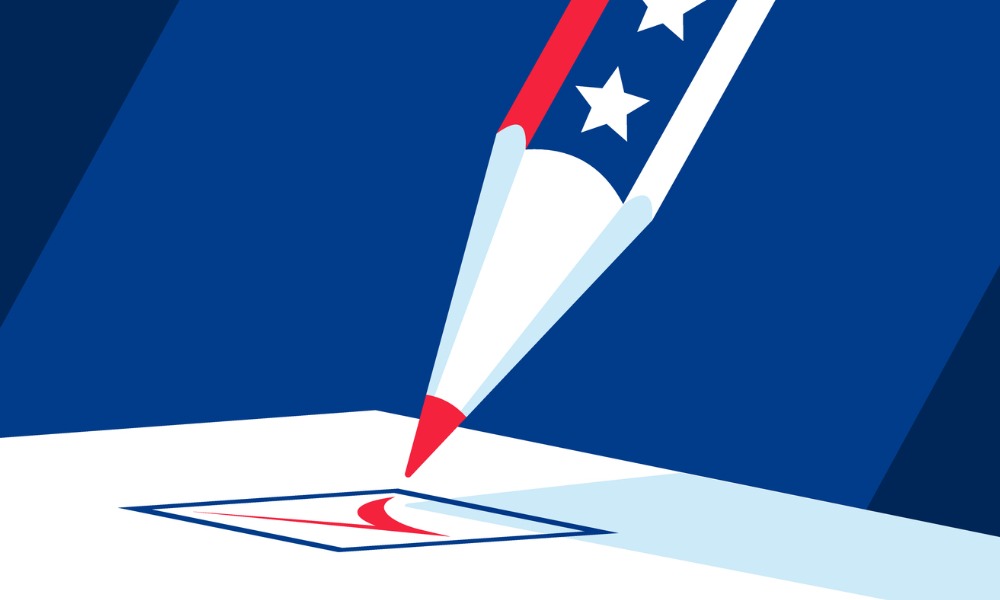Widespread impacts and implications as Trump and Harris square off, especially for Canadian investors

The summer is typically the ‘slow season’ in US elections. Yet this year, the ‘slow season’ has given us more twists and turns than a high-concept HBO drama. There’s been a disastrous debate, the exit of a sitting President, an assassination attempt, and the rise of a new candidate. All that before the real starting gun fires after labour day.
Investors have been feeling the bumps and bruises from this election rollercoaster already. While US investors are living in that noise, Canadian investors can only sit back and be reminded of the old quote from Pierre Elliot Trudeau addressing Richard Nixon: “Living next to you is in some ways like sleeping with an elephant. No matter how friendly and even-tempered is the beast, if I can call it that, one is affected by every twitch and grunt.” You’d be hard-pressed to call the Untied States “even-tempered” in this election cycle.
Claudio Chisani has been managing the impact of these elections for his clients. The portfolio manager and investment advisor at BlueShore Financial outlined how he sees this election cycle impacting markets in general, and Canadian asset managers in particular. He outlined what we’ve seen so far in markets and offered some perspective on the sheer volume of noise now coming out of US news media and politicians.
“There are so many chapters to be written that I don’t think we can watch for one particular thing, but we are going to need to wait for the final results to see exactly how the economy and individual sectors will be organized, because this will have a dramatic impact on Canada, with the Canadian economy so tied to the US economy,” Chisani says.
Following the first presidential debate in late June — at which President Biden’s age and diminishing capacity was made evident — markets began pricing in a Trump victory. The so-called ‘Trump Trade’ favoured businesses and sectors that would benefit from less regulation and more accommodating monetary policy. That includes Canadian oil & gas names.
Since Biden opted to bow out of the election and Kamala Harris has become the Democratic nominee, polls have shown a tighter race. Now Chisani says that investors are viewing the election as too close to call, with a number of key sectors subject to greater volatility as a result.
Sectorally, Chisani sees financials, oil & gas, and healthcare benefitting from a potential Trump win. If Harris wins, he expects stronger investor interest in ESG-related sectors and marijuana stocks. He sees Canadian investors as subject to this outcome. If Trump cuts renewables subsidies, the Canadian investment in electric car battery plants may be negatively affected. As well, Trump’s predilection towards protectionist tariffs may be a serious risk for Canadian exports, both of natural resources and manufactured goods.
While Canadian investors know to watch US news closely, given how connected our fates are to that of the US economy, there is a point at which the noise coming out of US election cycles becomes unhelpful. Chisani highlights the importance of reining in animal spirits in the face of dramatic headlines. He tries to keep investors focused on the underlying regulatory implications of each twist in this election cycle and how those might impact the US and Canadian economies. That focus can help investors tune out the more sensational aspects of the news cycle.
From a Canadian standpoint, Chisani thinks that a possible Trump victory may have some macro impacts in terms of our commitment to NATO and the USMCA deal — the successor to NAFTA. Trump has repeatedly called for other NATO members to shoulder more of the burden of collective defence, which could result in increased defence spending and greater budget shortfalls. The USMCA could be reopened resulting in greater tariffs on Canadian steel, aluminium, dairy, and other products. Republican politicians have voiced the desire to impose a 10 per cent tarrif on all imports, which could be devastating for many Canadian businesses.
The other major area to consider is what happens if Trump loses but does not accept defeat. As with the 2020 election, we have seen a degree of willingness to incite civil unrest. Chisani anticipates that markets will remain nervous around these risks, and we may see significant volatility in the weeks following the election. However, if the result is clear enough and that unrest does not spiral, then he expects markets will adjust to the volatility and normalize.
For all the ways this election feels unique and especially volatile, Chisani says that navigating this moment as an asset manager should involve the same approach as other similar volatile periods.
“It’s very much like a boat going into a storm, you have to be prepared in advance,” Chisani says. “When markets become volatile the market leaders may run, but they could fall just as much when the news is not favourable. I think you should be looking at a proportion of value stocks and dividend payers. As long as cash flow is abundant, then you can absorb a little bit of volatility, better than going for growth and seeing the market value of your portfolio fluctuate without receiving any payment.”



